What Is Cloud ETL: How It Works & Cloud ETL Tools
Summarize this article with:
✨ AI Generated Summary
The data you deal with daily is often present in disparate sources. Integrating this data into a single repository enables you to manage and analyze it better. Cloud ETL solutions offer a streamlined approach to extracting, transforming, and loading enormous datasets into a centralized repository. This helps produce valuable business insights and enhance business performance with ease.
This article highlights the Cloud ETL process, how it works, and tools that enable you to perform the ETL process over cloud infrastructure.
What is Cloud ETL?
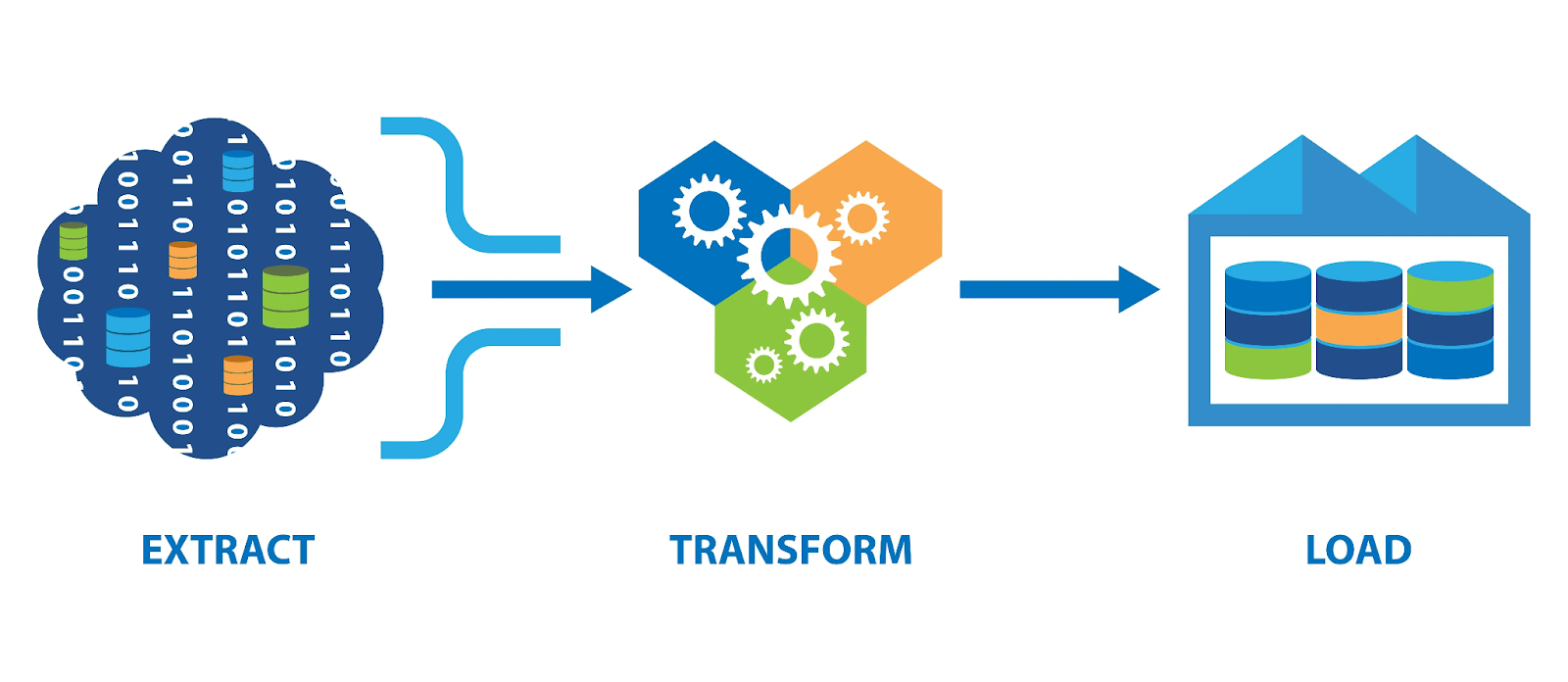
Cloud ETL is a cloud-based data integration process that leverages the power of cloud technologies to perform data extraction, transformation, and loading tasks. It involves utilizing cloud infrastructure to seamlessly integrate data from dispersed sources into a centralized location, such as a data warehouse or a data lake.
By harnessing the power of cloud infrastructure, you can efficiently manage and process large volumes of data to perform analysis and reporting.
Benefits of Cloud-Based ETL
Cloud-based ETL is a robust technique for managing large volumes of data from various sources. In this section, you will explore the benefits of the cloud-based ETL process and how it can enhance your data integration journey.
- Advanced Data Security: Cloud ETL tools provide advanced data security features by investing in compliance regulations that make them a better choice for handling sensitive data. By offering encryption, data governance, and access control features, Cloud ETL solutions help maintain your organization’s data security and regulation standards.
- Scalability: Cloud ETL solutions enable you to handle huge amounts of data despite fluctuating workload demands. This allows you to scale resources up or down based on your data processing requirements.
- Maintenance: Data integration often involves significant overload in maintaining software, hardware, and security. But with Cloud ETL platforms, you don’t need to worry about maintenance, as these requirements are handled by a cloud provider.
- Cost Effectiveness: Cloud ETL offers a pay-as-you-go feature, where you pay for the services you use, eliminating the upfront fee. This allows you to optimize costs, including fine-grained control over compute and storage resources, auto-scaling, and resource monitoring.
Open Source Cloud ETL Tools
This section will review the prominent industry-level Cloud ETL tools to streamline your data integration tasks.
Airbyte
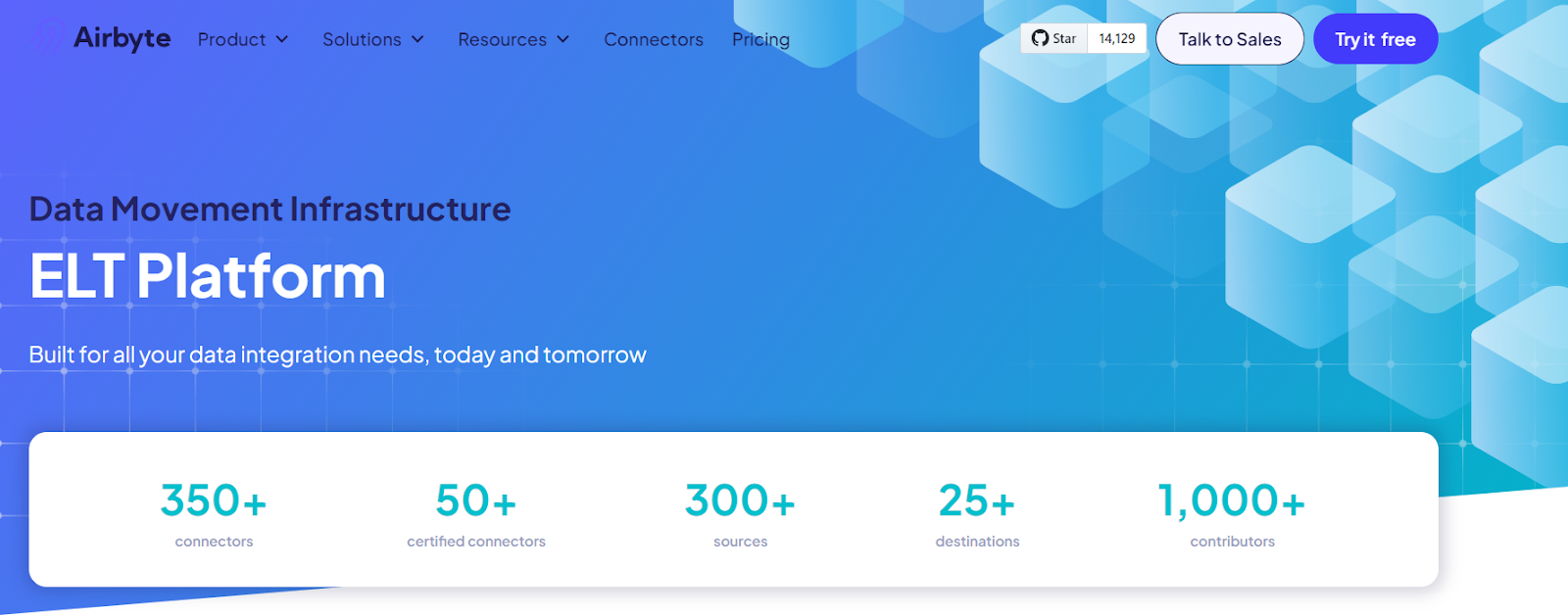
Airbyte is a cloud-based platform designed to simplify data integration. It enables seamless data movement and replication from multiple sources into a centralized location of your choice. With a vast library of 350+ pre-built connectors and the flexibility to create custom integrations, Airbyte empowers you to efficiently build and manage data pipelines.
Here are a few features that make Airbyte a unique choice among Cloud ETL platforms:
- Modern GenAI Workflows: Airbyte lets you load semi-structured and unstructured data directly into prominent vector store destinations, including Weaviate, Pinecone, and more. With RAG-specific transformation support, Airbyte lets you perform chunking and embedding operations within a single step.
- Custom Connector Development: Airbyte’s Connector Development Kit lets you create custom connectors if the source you seek is unavailable in the pre-built options.
- Incremental Sync: Airbyte’s incremental sync mode enables you to replicate modified data into the target systems rather than the whole database.
- Pipeline Development Flexibility: It features versatile solutions, such as a UI, API, Terraform Provider, and PyAirbyte, to develop and manage your pipelines according to your specific requirements.
- Multiple Deployment Options: Airbyte provides flexible deployment options, including cloud, self-hosted (open-source), and hybrid.
- Fully Secured: Its compliance with major security standards like SOC 2, HIPAA, and ISO 27001 makes it one of the most secure Cloud ETL tools.
Keboola
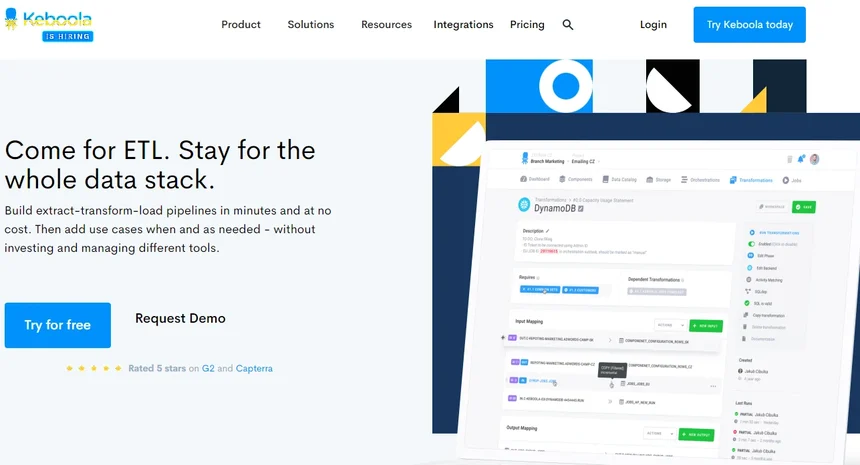
Keboola is a popular cloud data integration tool that helps you to automate ELT, ETL, and reverse ETL pipelines. It allows you to pull data from multiple sources, apply transformations, and load the data into a central destination for analysis. Kaboola supports structured and unstructured data, allowing you to deal with data of any format.
Here are a few features Keboola provides:
- Multi-Connector Option: Keboola offers over 400 data connector options to migrate your data from various sources to destinations.
- Data Transformation: It supports robust data transformation features, including data cleaning, aggregation, and enrichment, enabling you to perform complex transformations with ease.
- Intuitive User Interface: Keboola's intuitive user interface simplifies the data pipeline building process. With custom workflows, you can easily extract data from various sources, apply business logic, and load it into a destination.
Singer
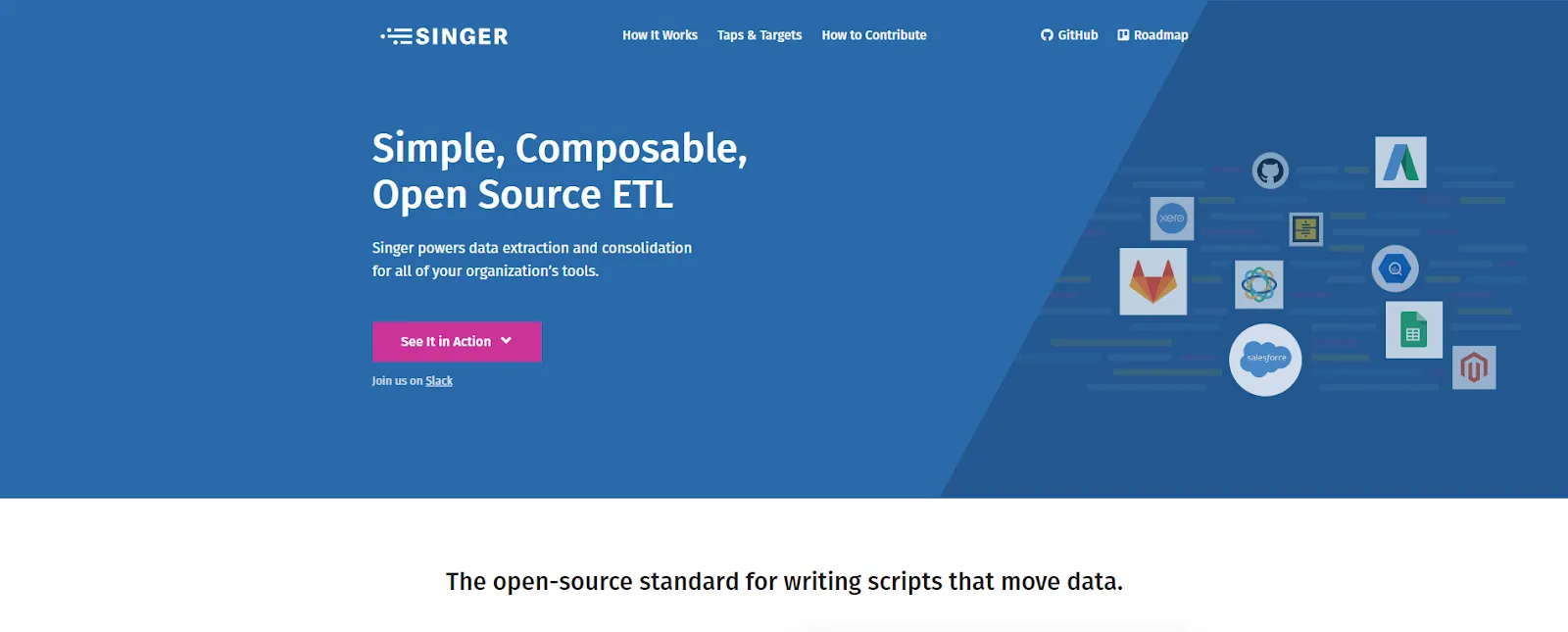
Singer is an open-source Cloud ETL platform that lets you build custom data pipelines. It offers pip-installable libraries for extracting data from various sources (taps) and loading it into desired destinations (targets). Although Singer doesn’t provide native transformation features, you can leverage Python’s abilities to perform data transformations.
Let’s explore the key features of Singer:
- JSON Support: Singer taps extracts data from the source and transforms it into JSON format, making it easier for you to work with.
- Incremental Extraction: Singer supports incremental extraction that enables you to track and migrate only the updates made to the source rather than copying the whole dataset.
Apache NiFi
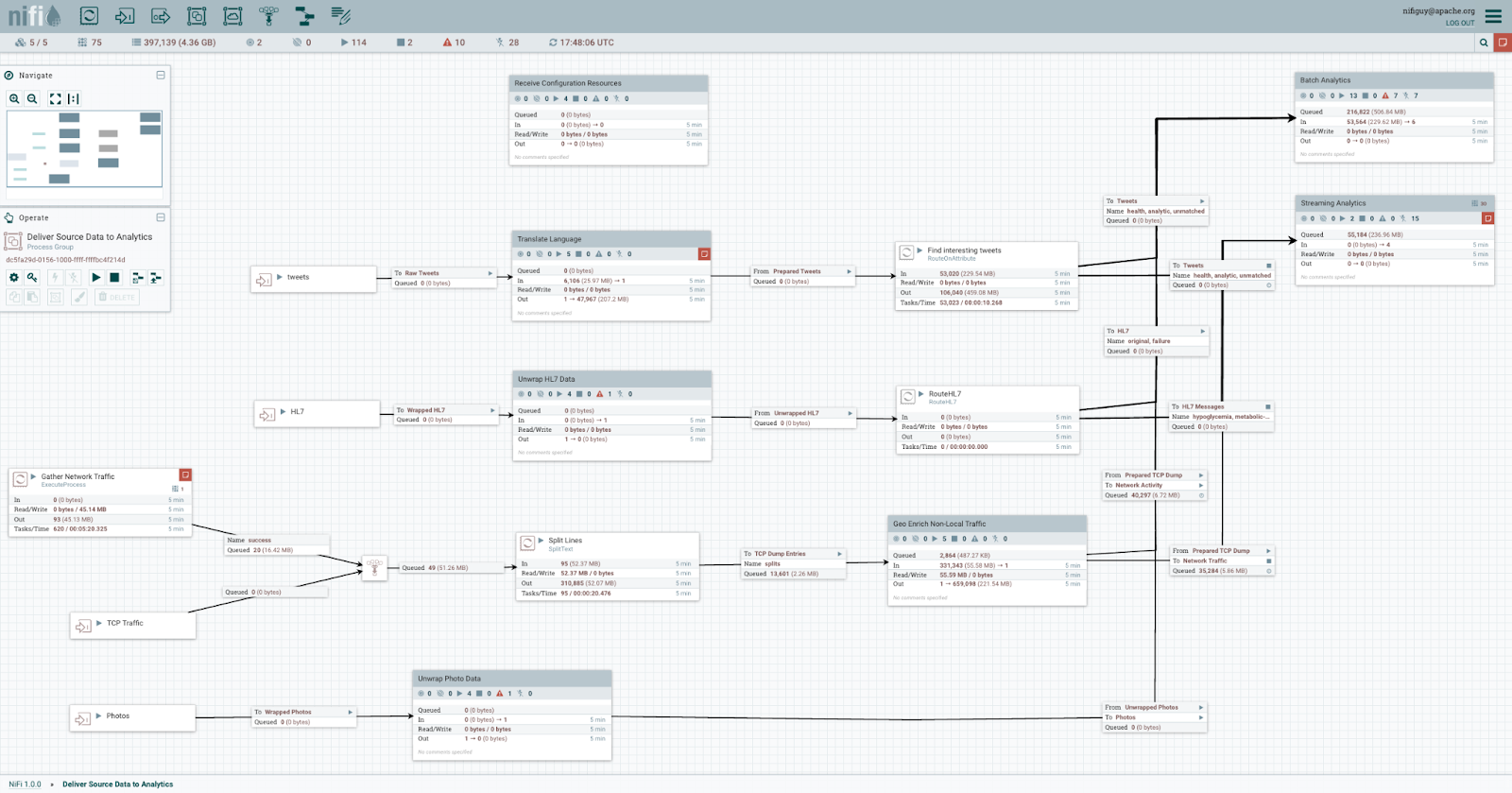
Apache NiFi is an open-source data integration platform that allows you to manage and automate data flow between multiple systems. It provides a simplistic UI and supports multiple data sources and destinations, including prominent databases, APIs, and streaming platforms.
Here are a few features of Apache NiFi:
- Directed Graphs: Apache NiFi allows you to simplify complex workflows by representing them as directed graphs, which represent a collection of objects (nodes or vertices).
- Data Transformation: It lets you perform transformations to make it compatible with the destination.
- Data Provenance: NiFi provides fine-grained provenance for the data received, forked, cloned, modified, sent, and dropped upon reaching the end state.
Pentaho Data Integration
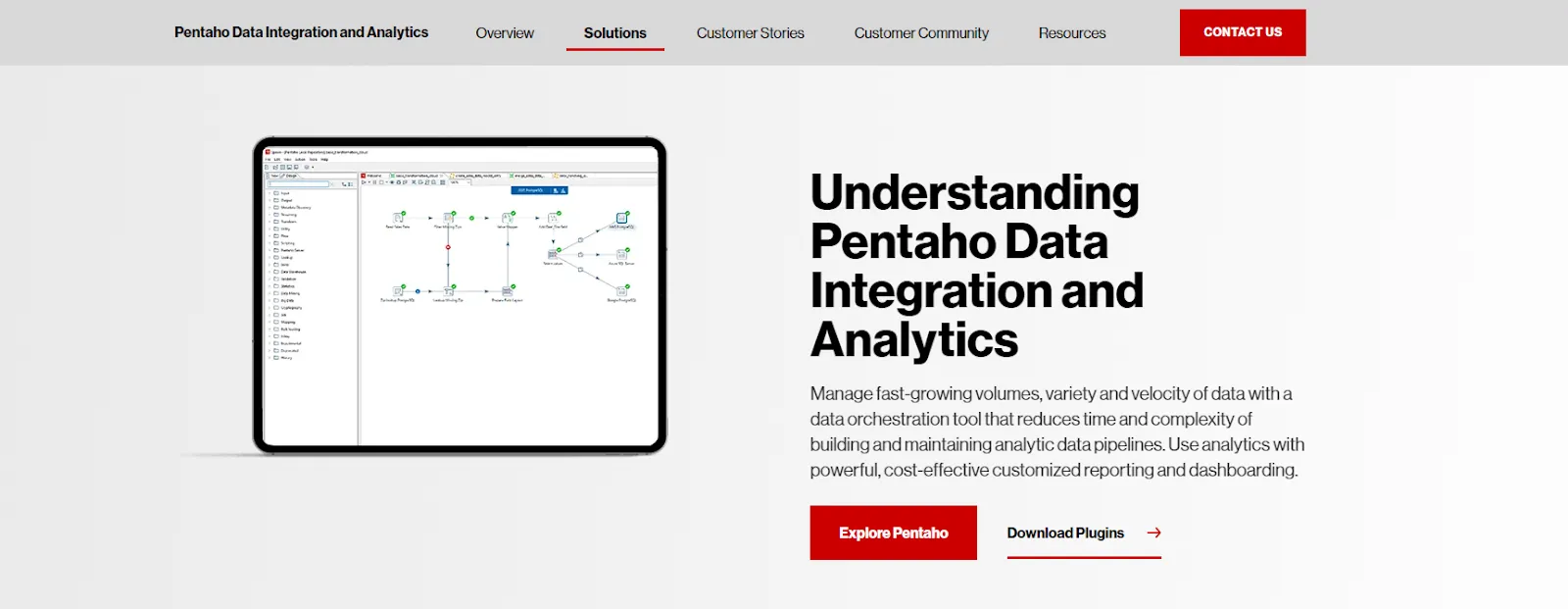
Pentaho Data Integration (PDI) is a user-friendly tool that provides a low-code environment to perform ETL tasks over cloud infrastructure. It simplifies extracting, transforming, and loading data from multiple sources into a single destination, working as a single source of truth.
Let’s look at a few features offered by Pentaho Data Integration:
- Accelerate Data Onboarding: With Pentaho, you can accelerate the process of onboarding complex data projects by reusing transformation templates for multiple projects.
- Flexible Deployment: Its robust transformation engines enable you to easily integrate various platforms, including AWS, Azure, and GCP, whether on-premise or in a cloud-based environment.
- Ease of Use: PDI offers a drag-and-drop interface for building data pipelines, even enabling non-technical users to perform complex tasks.
- Community Version: Pentaho offers an open-sourced community version that provides core engines with lesser functionality to help you understand the platform.
CloudQuery

CloudQuery is a cloud ETL framework that provides a wide range of plugins for data integration tasks. It lets you extract, transform, and load data from cloud APIs to various destinations, including data lakes, databases, or streaming platforms. This process can enable you to analyze the data and extract useful insights that can help enhance your business performance.
Here are a few features provided by CloudQuery:
- Optimized Data Processing: CloudQuery utilizes the concurrency model with lightweight goroutines to optimize ETL performance.
- Transformations: CloudQuery offers SQL transformations and dbt support, which enables you to transform the data and visualize it using your current BI stack.
- Flexible Deployment: It can either be executed locally or in remote environments.
Key Features of Cloud ETL Platforms
This section discusses some of the most important features to look for before selecting a Cloud ETL platform.
- User Friendliness: The cloud-based ETL tool you choose must be highly interactive, enabling technical and non-technical users to integrate data effortlessly.
- Pre-built Connectors and Customization Flexibility: The Cloud ETL tool must provide several connectors for seamless data extraction from multiple sources. If the tool doesn’t have the connector you want, it must provide a custom connector development facility.
- Transformation Capabilities: After extracting data from the source, the Cloud ETL tool must offer transformation capabilities to make it compatible with the destination.
- Compliance and Privacy Standards: The tool must comply with global and local data-sharing regulatory laws and rules to protect data from unauthorized access.
Use Cases of Cloud ETL
Use cases of Cloud ETL include:
- Data Warehousing: Data warehousing helps consolidate data into a centralized repository. Through meticulous transformation steps, raw data is cleaned into a consistent format. This unified data enables you to improve data accessibility for downstream applications.
- IoT Data Integration: Cloud ETL lets you extract data from multiple IoT devices, transform it, and load it into a central repository. This enables you to derive actionable insights effectively.
- Marketing Analysis: You can streamline marketing data integration for effective campaign performance measurement and optimization.
Data Security with Cloud ETL
Data security is the most important aspect to consider before selecting any Cloud ETL solution. The cloud based ETL solution must follow robust security measures to protect your data during the extraction, transformation, and loading.
To identify which tool meets security standards best, look for features like encryption, role-based access control, and compliance certificates. Some of the most common security certifications include GDPR, CCPA, HIPAA, and ISO 27001.
When to Choose Cloud-Based ETL Tools?
Your organization's data requirements can influence your choice of a cloud-based ETL tool. For example, if you deal with highly sensitive data, you can choose a cloud solution that meets strict regulatory compliance.
Alternatively, you can also implement the ETL process manually, but this can become inconvenient and frustrating, requiring you to manage processes with manual interventions. Cloud ETL tools help you manage large volumes of data without stressing about software or hardware updates and infrastructure maintenance, enabling you to save time and money.
Key Takeaways
Cloud ETL is an essential part of data lifecycle management over the cloud. It utilizes cloud infrastructure to perform data extraction, transformation, and loading. Cloud ETL tools can enable you to streamline the ETL process by providing pre-built connectors, improving the performance and time utilization.
Before choosing a Cloud ETL tool, consider certain things that enable you to efficiently utilize its full potential. The key features an ideal Cloud ETL tool must have are user-friendliness, customizability, and adherence to privacy standards.
FAQs
Q. What Are the Disadvantages of ETL?
ETL is generally an advantageous process, but some limitations might occur, including data latency, complexity, scaling issues, and more.
Q. What Is the Best Cloud ETL Tool?
The most popular Cloud ETL tools are Airbyte, Keboola, Apache NiFi, Singer, Pentaho Data Integration, and Hevo Data.

